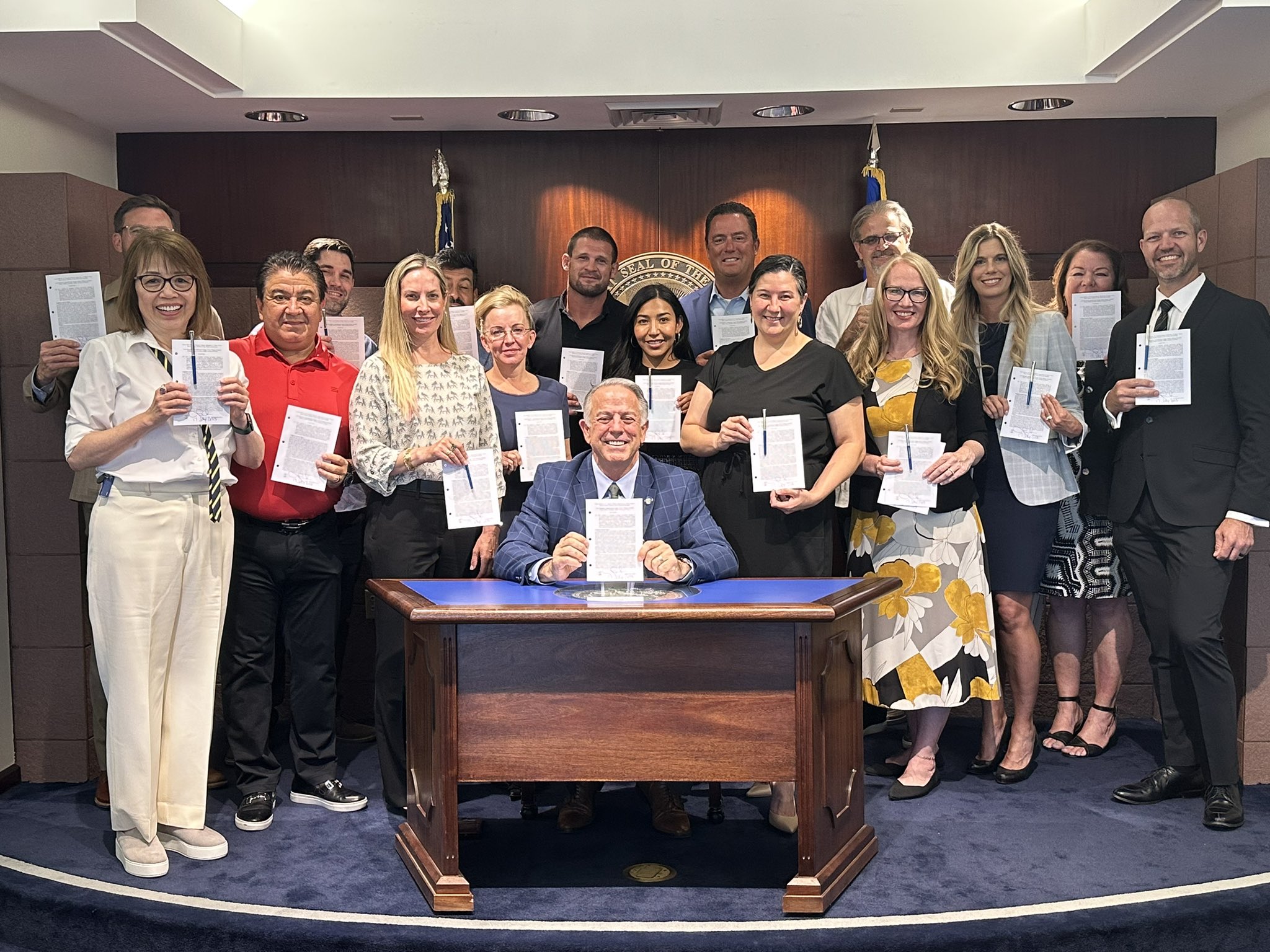Regardless of which state we’re speaking of, every state’s individual cannabis industry is a multi-layered machine where every position and profession plays a unique and major role in the mostly successful operation of that industry. Far from just budtenders and the occasional brand ambassadors, the continued success of the American cannabis industry greatly benefits from several different ancillary and non-plant-touching yet vitally important roles. Human resources managers for employment-related matters, accountants and financial advisors specializing in the very uncharted world of cannabis finance and proper banking and most notably, lawyers from some of the most prestigious law schools in America who practice several different types of law.
Within every facet of cannabis business, lawyers and their particular expertise in various fields of law are necessary and endlessly useful. When cannabis conglomerates such as the parent company of the Las Vegas cannabis megastore Planet 13 announced their nearly $50 million acquisition of Florida-based VidaCann LLC, you can bet that a team of diligent lawyers for both parties were ever present and facilitated the multi-million dollar acquisition. When tax season comes around and fully compliant cannabis companies are unsure of how to properly go about filing taxes due to the confusions caused by Tax Code 280E on top of various state taxes, lawyers who specialize in taxation law are certainly being consulted with.
When cannabis companies need to ensure that they’re remaining one hundred percent compliant with the oftentimes strict and stringent regulations present in every cannabis-selling state, they are certainly hiring a lawyer to provide that guidance, counsel and security from excessive fines and punishments. For all types of litigation, from partner disputes to trademark issues, to administrative hearings and eventual settlement negotiations, experienced lawyers across America are being hired. Professional cannabis operations touch upon every field of law despite remaining illegal in the biggest and most powerful field of law, that being the federal level.
One such brilliant and distinguished attorney who leads a business organization advocating for the betterment and strengthening of the Nevada cannabis industry is Nevada Cannabis Association Executive Director Layke Martin.
Being born and raised in Las Vegas, Martin decided to attend UNLV for her undergrad, where she also followed in the initial footsteps of many great attorneys and majored in broadcast journalism, where she graduated with a Bachelor of Arts in 2002. While working at Channel 3 KSNV, then KVBC, Martin was a news producer for the 5 AM morning show. Martin admits that this was a very valuable opportunity to be a news producer being so fresh out of college, but this incredibly early morning slot meant that she’d arrive at the office at 9 PM, while almost everyone else was unwinding after a long day.
“In part, I applied to law school to get out of working overnights.” Martin joked. “At the time, it was a reason to move to a new city and try something new, so I only applied to East Coast schools. Which is how I ended up going to Boston University.”

Another previous experience that certainly influenced Martin’s decision to attend Boston University’s School of Law is the fact that she interned at former Nevada Senator Harry Reid during her time at UNLV.
“Prior to law school, I was always interested in both policy and politics. I picked Boston University because it has a legislative policy and drafting clinic. During my 1L summer, I was doing an internship at Greater Boston Legal Services, and my supervisor told me that I have an aptitude for litigation and should pursue litigation instead. I was so delighted to have her mentorship and so I switched to the litigation clinic and after law school, I practiced business litigation at a law firm here in Las Vegas for almost five years. My course started with policy and legislation, then switched to litigation.
It took me about 15 years to get back to the type of work that led me to law school, and now I don’t practice litigation at all and practice all policy work.”
Before serving with the Nevada Cannabis Association, Martin served a variety of esteemed positions with UNLV’s Boyd School of Law for over a decade. From an adjunct professor for the legal writing program to Director of Career Development where she helped fresh law school graduates find employment and opportunities in the legal industry, Martin spent nearly five of those years serving as the very illustrious and influential Assistant Dean for External Relations.
“I ended up overseeing not only career development but alumni relations, fundraising, communications and events and everything outward facing at the law school. So, managing the relationships on behalf of the law school, managing events and bringing the community together whether that’s our alumni communities or donors, policy makers and elected officials making sure that the law school was a part of those important policy and legal conversations.”
Martin references one of her biggest highlights during her time at the Boyd School of Law being the 20th anniversary celebration of the creation of the school. At this celebration for such an incredible milestone for a small but dedicated law school started in a desert that held their first classes in an elementary school, the keynote speaker was the long-time Delaware senator who later served as Vice President under Obama and before taking the highest office in the land himself, President Joe Biden.
After a career-defining decade at the Boyd School of Law, Martin was invited to apply for the position of Executive Director for the organization then called the Nevada Dispensary Association, the business organization founded to “develop and promote best practices among Nevada cannabis businesses as well as supporting the efforts of cannabis establishments to provide high quality, safe cannabis to Nevada’s consumers”, according to their website.
“I knew that cannabis was a really interesting and fast-paced area that was an intersection of business, law and policy. While I didn’t have any experience in cannabis law at the time, that’s a common story for a lot of folks who do get into cannabis law. Until now, cannabis law hasn’t been something we studied in school. Now, we have more cannabis law and policy classes.”
“We’re starting to have more cannabis law and policy classes at UNLV., which is a graduate course in the School of Public Policy and we’re looking to expand the offerings at UNLV. The university also just launched the Cannabis Policy Institute, so I think that we are about to really see a lot more courses in different areas related to cannabis law, policy and regulation as well as administrative law in this area. We’re going to start seeing more lawyers and law students who have exposure to cannabis law while they’re still in school.”
 One of the most milestone moments for both Martin as Executive Director and for the organization itself occurred only six months into Martin’s term when the transition went from the previously named Nevada Dispensary Association into the Nevada Cannabis Association.
One of the most milestone moments for both Martin as Executive Director and for the organization itself occurred only six months into Martin’s term when the transition went from the previously named Nevada Dispensary Association into the Nevada Cannabis Association.
“We had previously only represented licensed dispensaries, and the board made the decision to open up membership to the other types of licensees– cultivation, production and distribution. From an advocacy standpoint, we’re much more effective when the industry is speaking with a unified voice and these new licensees have been a great addition. It’s been great everyone having a seat at the table and coming to these decisions and how we should move forward in unison.”
Among the board of the NCA, it’s entirely composed of board members and C-level executives from the most notable names and brands in Nevada cannabis, from Thrive to Deep Roots Harvest to Fleur and even the distribution company Blackbird. Along with Martin, there’s also two other attorneys who are serving on the NCA board who specialize in varied fields of law that all pertain to cannabis.
On the subject of current federal and state policies that are detrimentally affecting the success and eventual expansion of the cannabis industry, Martin agrees with all other industry professionals in that Tax Code 280E is easily the most damaging policy. Martin hypothesizes that if cannabis were to be rescheduled to Schedule III, it would alleviate at least some of the steep taxation and financial-related disadvantages that come with Tax Code 280E.
“Even though we now have state legal businesses, it’s a Schedule I drug so they can’t deduct ordinary and necessary business expenses, resulting in a 70 to 80 percent effective tax rate. Even though we now have state legal businesses, it’s a Schedule I drug so [these businesses] can’t deduct ordinary and necessary business expenses, resulting in a 70 to 80 percent effective tax rate. That is the biggest hindrance. That’s why it’s so hopeful, looking at some of the potential outcomes of rescheduling from Schedule I to Schedule III, such as the removal of 280E from applying to these businesses.”
For Nevada specifically, Martin believes that there needs to be effective policies in place to minimize the illicit market, but also without starting another colossally unsuccessful drug war.
“But I don’t think enforcement alone is the answer, and we are always looking at ways to reduce the cost of regulatory compliance and taxes, because those prices are part of what contributes to people purchasing from the unlicensed market instead of the licensed market. I don’t think there’s an easy answer and there needs to be more of a comprehensive approach.”
Still, Martin stresses the importance of finding a solution to dealing with the rampant illicit market that has greatly impacted other states’ legal industries such as California. Although since the two states share a border, California’s cannabis problems often become Nevada’s problem, as quite a bit of illicit cannabis from California ends up being sold in the illicit Nevada market.
As the Nevada cannabis industry goes into the presidential election year of 2024 and the state prepares for the 2025 Legislative Session, the NCA has several plans to continue to advocate for the strength and possibilities of the state’s industry.
“We’ll spend the next year meeting with candidates, and particularly for the Legislature, we do most of our work at the state level. We’ll bring them on tour of cannabis businesses, educate them about the benefits to the state as well as the challenges that cannabis businesses face. In terms of issues, we have a super fast-paced industry and a Legislature that only meets every two years. Some of the limitations are in statute and so we have to go back sometimes and find ways to clean that up in the next Legislative session and a way to streamline operations, such as agent cards and the number of necessary agent cards and application fees.”
Josh Kasoff can be reached at [email protected].
The post Lakye Martin Esq. with the Nevada Cannabis Association appeared first on Vegas Legal Magazine.